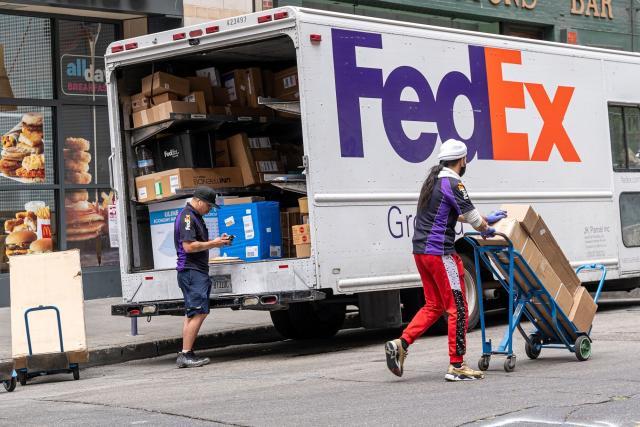FedEx Corp. is seeking to cut $4 billion in costs by combining its two main delivery networks, in an ambitious plan by new Chief Executive Officer Raj Subramaniam to increase profit margins.
The courier has for decades operated an express package business separately from its ground unit, which FedEx acquired in 1998 and depends on third-party contractors to make the last-mile delivery of parcels. As of June 2024, it will be “a single company operating a unified, fully integrated air-ground network under the respected FedEx brand,” the company said Wednesday in a statement.
“FedEx is at a pivotal moment in history,” Subramaniam said during an investor meeting in New York. “There is significant value in FedEx that’s being unlocked for shareholders.”
The courier’s shares rose 3.8% at 9:49 a.m. in New York. The stock has been trading almost 30% below its May 2021 peak.
FedEx has trailed United Parcel Service Inc. on profit margins even though its larger rival has a unionized workforce and pays its drivers more than twice what their counterparts at FedEx’s ground network make. Many analysts point to the efficiencies of UPS’s single delivery network as the reason. In the latest quarter, UPS reported adjusted operating margins of 13% compared with just 5.2% for FedEx.

The reorganization is a turnabout from the strategy of founder Fred Smith, who defended having multiple networks as a competitive advantage. Critics often noted that an express driver would stop at the same location as a ground driver, creating inefficiencies. Under Subramaniam, FedEx accelerated the shift of packages from its Express unit, where FedEx owns delivery vehicles and drivers are on the company payroll, to the contractor-led ground business.
The company didn’t give details in the statement on job cuts and a spokesperson offered no specifics on the scope or timeline. FedEx already had been reducing its workforce in recent months, including shedding 10% of top management jobs.
“We will continue to focus on responsible headcount management in our operations as well as corporate functions,” spokesperson Rachael Simmons said in an email Wednesday.
FedEx is trying to regain its footing after Subramaniam was forced to scrap profit growth goals outlined last September due to declining package volumes. He had unveiled those targets just after he officially took over as CEO in June.
The company expects to achieve $4 billion of permanent cost reductions in fiscal 2025. FedEx said it seeks to save an additional $2 billion from revamping its delivery network by 2027. The savings will include initiatives to move more ground packages by rail instead of truck and provide contractors with better forecasts on volume to reduce the need for emergency help to deliver packages.
FedEx’s board also approved a 10% increase in the annual dividend for fiscal 2024 to $5.04 a share.
The plan to boost profit addresses a commitment to investors, led by activist shareholder D.E. Shaw, that FedEx made only two weeks after Subramaniam took the helm. It promised then to boost dividends, rework its executive pay rules and reduce capital expenditures. Under the agreement, D.E Shaw named two board members.
D.E. Shaw has cut its holding of FedEx to about 63,000 shares from a recent peak of 1.25 million shares at the end of 2021.
FedEx said Richard Smith, son of the founder, will be in charge of Airline and International and John Smith will be in charge of all ground operations, including FedEx’s standalone freight business.

Follow us on social media: